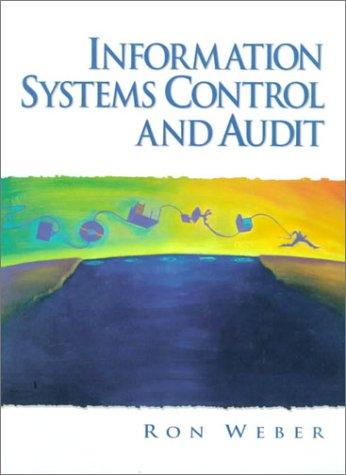Read the description for Case 7-5. The following details apply to the review you are conducting on
Question:
Read the description for Case 7-5. The following details apply to the review you are conducting on the state of controls within the company.
As part of your review of the Melbourne switch site, you examine the status of disaster recovery planning. In terms of short-term recovery, controls appear to be in place and working. Backup tapes for all data and programs are stored both on and off site to enable recovery if programs and data are lost for some reason. In addition, protocols for short-term recovery are well documented. Operators seem to be familiar with and well trained in these protocols. From time to time they have to exercise these protocols because some temporary system failure occurs. Because MM claims to offer its customers 24 -hour service, all personnel recognize the criticality of being able to recover the system accurately and completely on a timely basis.
When you examine controls over long-term disaster recovery, however, the situation is different. There is no long-term disaster recovery plan, nor are operators and other personnel trained in recovery protocols for a major disaster. For example, it is uncertain how MM would recover from a fire that destroyed the switch or an event that caused major structural damage to the switch.
As a result of your findings, you meet with the managing director to find out why controls in this area are so weak when controls in other areas seem strong. She is surprised by your concern about long-term disaster recovery. She argues that for three reasons it is not cost-effective to prepare a longterm disaster recovery plan and to practice recovery protocols on a regular basis. First, she believes it is useless having a long-term disaster recovery plan because, in the event of a major disaster, timely recovery would be impossible anyway. She points out that it would take several days for the telephone company to reconfigure all the data communications lines to another site. Even if MM had another switch available immediately, it could not operate during this period. Second, she argues that long-term disaster recovery cannot be practiced because MM's customers would not tolerate a decrease in their service levels while disaster recovery exercises were carried out. Unless the recovery protocols are practiced regularly, she points out, they are useless. Third, she contends that eventual recovery will not be a problem anyway. Operations can simply be transferred to another switch in one of the other capital cities. While the telephone company reconfigures data communications lines to the other switch, backup files can be flown to the site with plenty of time to spare. She argues that the customers of MM recognize they will not be able to use their electronic funds transfer facilities during the recovery period, but they accept this situation as a risk of doing business. The only other alternative, she argues, is to replicate all switching facilities in each capital city, and multiple hot sites for backup and recovery purposes are clearly not cost-effective.
Required. Outline how you intend to respond to the managing director's comments in your report to the board of directors on the state of controls in MM's computer operations.
Step by Step Answer:






